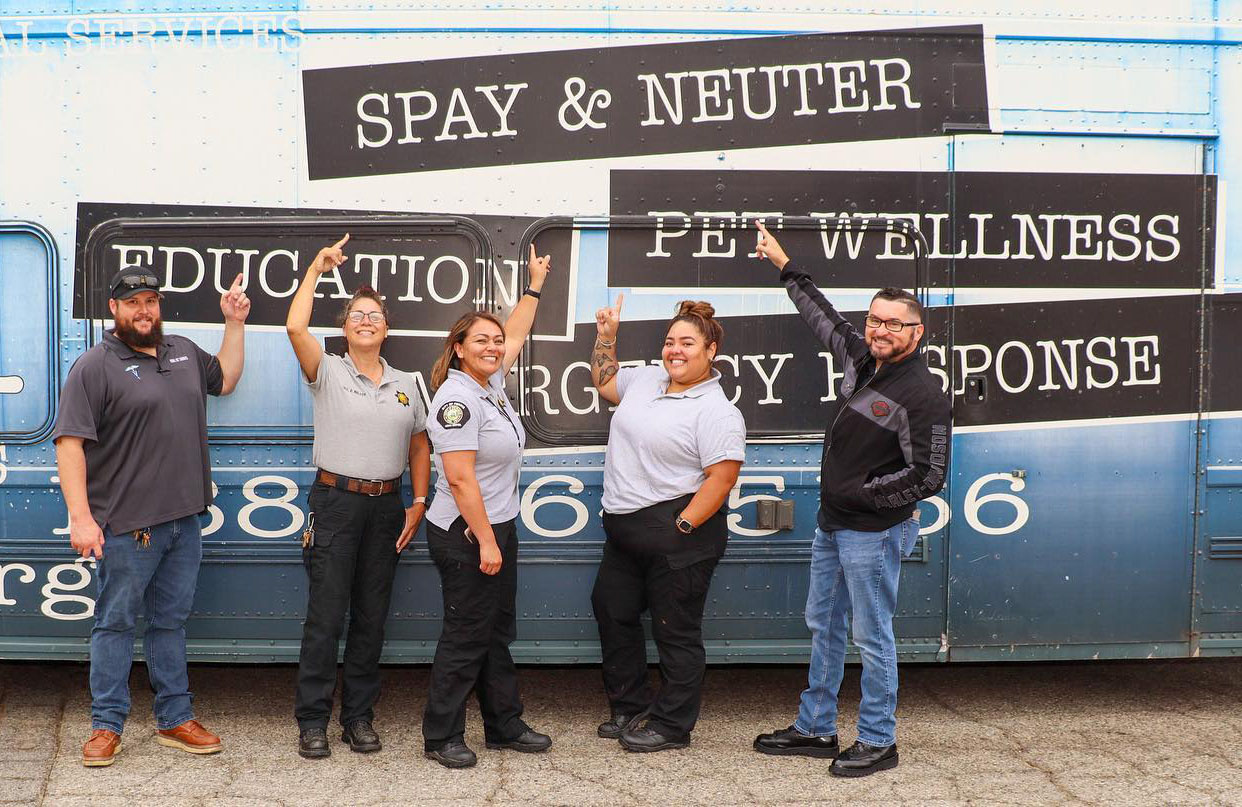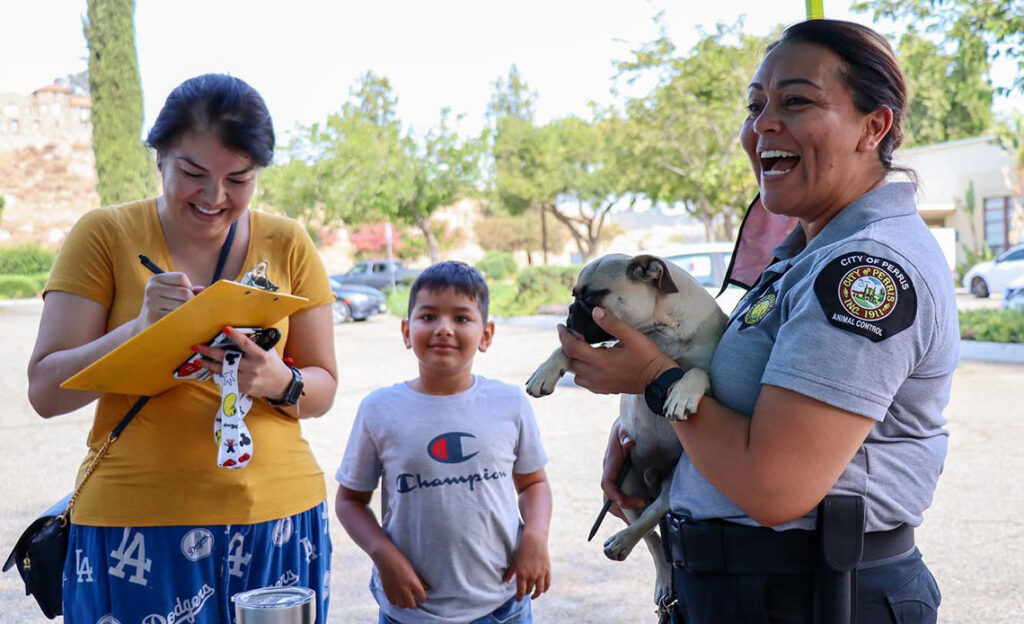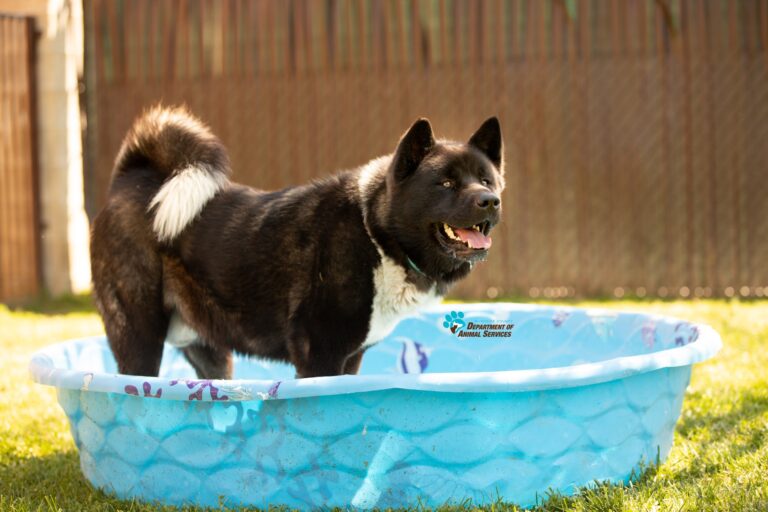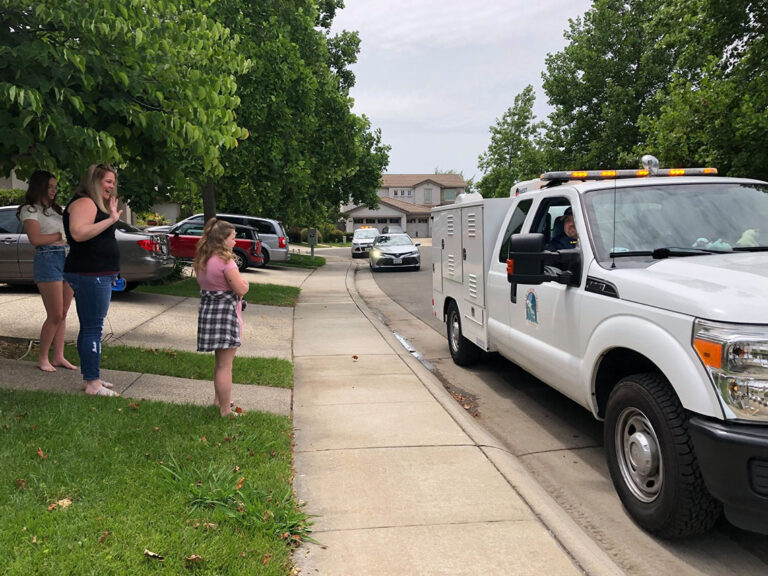In 2014, Christina Avila was burned out. She took a hiatus from animal welfare and reluctantly returned a year later, when she joined the City of Perris Animal Control as Senior Animal Control Officer. “I didn’t want to do it anymore,” Christina recalls. “Then I was at home with three boys, and I had to come back to work. Financially… I was desperate for a job.”
Fast forward eight years: When Christina’s not online looking for lost pets or posting found pets to the local Facebook group, she’s checking in with neighbors and their pets, applying for grants and launching new programs, and passionately pursuing new opportunities that will help people and animals in Perris thrive. So how did Christina go from total burnout to lighting a fire under her team to adopt a new culture of support?

From boxed in to blank slate
When Christina arrived at the City of Perris, an animal services agency that contracts its sheltering needs with Riverside County, there wasn’t much in the way of programs, a stark difference from the sizable organization where she’d been the previous eight years. There weren’t protocols in place to help lost animals return home or even a way to connect an animal with their owner. There were two options for a cat or dog brought into her agency: euthanasia or a ride to the county shelter.
If her previous organization had her feeling like she was working within a predefined box, Perris represented a blank slate. Christina immediately saw opportunity. “Here, if you are willing to go beyond your job description and want to do more, they’ll allow you to do it. I was given a chance to do what I wanted to do.”
Knowing the importance of building programs on data, she chose Chameleon to start tracking animals and outcomes and set up a licensing program to register owners to their pets. She opted to forgo redemption fees and kept the licensing fees nominal. With a foundation in place, she was ready to start building the department she envisioned, one that met families where they were and offered support to keep pets in their homes.
How her past shaped her forward-thinking vision
The hardest part is getting people to understand we can help, that we’re here to help. I’m here for you, and I’m going to go all the way.
—Christina Avila
Christina never had money growing up, but her mother always scraped together the funds to get their animals spayed and neutered. “My mom related to animals. I’ve always had that empathy for dogs and cats. Growing up an only child, those were my brothers and sisters. But I also relate, too, to growing up in the Hispanic culture where, like, dogs don’t come in the house.”
Avila credits her upbringing for adding balance to her approach and giving her a well-rounded view of the world. Having watched people in her own life lose their housing while struggling with addiction, she recognizes the need to dig beyond the surface to find the roots of challenges and address the systemic issues that fuel cycles.
“Everything is not so black and white. What do they need? Is there an opportunity to educate? Every situation is its own situation. What’s working for this family doesn’t work for this family or this family.”
From firsthand experience, she also knows it’s not enough to announce a change in approach from punitive to supportive; agencies need to build trust with the community. “If the dog is being cared for, I’m not here to take it from you. The hardest part is getting people to understand we can help, that we’re here to help. I’m here for you, and I’m going to go all the way.”
His name is Julio: Keeping pets and people together
Christina recently had an opportunity to build that trust while working with a woman whose dog had developed a hematoma. She wanted to have it removed, Christina learned, and was committed to doing the daily post-op vet care, but she couldn’t afford the surgery.
“Back in the day we would have said, okay, you can sign it over. And we would have euthanized the dog. And now, now… his name is Julio. Julio has a life! And they want to keep him, and this is a family member. I was able to call the county, and with some of their grant money, they were able to fix his ear.”
Christina has worked hard to redesign her department’s culture and counter the assumption that the only two choices are a trip to the shelter or euthanasia, but she recognizes the difficulty that arises when the vet care pet owners want is out of reach. And in Perris, as in much of California, essential vet care such as spay and neuter can be especially hard to come by.

Perris has a population of nearly 80,000 residents, many of whom have pets they love, yet only two options for sterilization: one is highly restricted, and the other, costing $300 or more, is unattainable for many working families. Christina knew a mobile clinic would make a huge difference for families in her community, if she could raise the funds to host it. When she saw the California for All Animals grant opportunity, she jumped.
“I didn’t ask anybody. I’ve taken one grant writing class and I was just trying to use my smarts. I was just hoping, hoping to get money to help the community. And it came through! I was so surprised! I think that was one of the happiest days of my life.”
Christina also secured a grant from the Pet Lover’s License Program to have another 75 large dogs sterilized, a grant to offer microchips and identification to every animal officers pick up. Her department is also currently participating in the Open Arms Challenge with the theme of “Mending Fences,” an initiative that would provide fence repairs, dog houses to shield animals from the hot summer sun, and humane deterrents for residents concerned about community cats in their yard.
Although it’s still early, she’s already seeing the fruits of her efforts. After receiving a California for All Animals grant to microchip animals, her team started using 24PetConnect and posting photos of lost dogs to various lost and found boards. Compared to the same three-month period in 2022, her team has more than doubled the number of dogs they’ve returned home. “And now we’re trying to think about what else we can do, “says Christina. “What else can we do to keep these animals from going to the shelter?”
As for Julio, “He’s doing good. I was just over there visiting him yesterday. He had his cone on and his owner was just so appreciative.”
The career-altering gift of autonomy
Ultimately, every one of these bright spots fueled Christina’s journey from burned out to on fire, with one in particular sparking her shift: an organization that believed she could do it.
“I felt valued here. […] Here, my ideas—I could go through with them. I could try something new. I wasn’t in a box anymore. I think that’s where my positivity comes from. I’m grateful I finally get to do what I always wanted to do.”
Perris also granted her the space and safety to reflect on her past. “I don’t think I was ready to be a senior officer. I was struggling with self-reflection in my personal life too, but as time has gone on, I see what my actions can do to other people. I’ve grown a lot in these past seven years. A lot.”
Today, she knows the power of autonomy and makes a point to ask her team for their input and opinions.
“How you show up, it really matters,” she says. “I want to carry with me everything I have to share. I think we all have something to share and we shouldn’t be afraid to share it, and I try to bring that out in the field. Like, I’m here for you.”
She wants other officers who might not feel like they are in the driver’s seat to know that their actions do have an impact: “Own yourself and don’t let the job own you,” she says. “You picked up a dog that you know was spayed, go pound that cement. Go door to door. Return that dog. Maybe you don’t do a couple of calls, but you get that dog home. And that dog doesn’t enter the shelter. You can make a difference.”
“This is really, really hard, and we wake up every day, and we come to our jobs to help.” In this short clip, Christina reflects on what she wishes everyone knew about the true nature of the work, opens up about one of the most difficult moments of her career, and shares how she got through it.
Related Stories

When the Heat Rises, Blythe ACO John Bush Has Your Back
Approximately 225 miles east of Los Angeles and 150 miles west of Phoenix, located inside of Riverside County and flanked by the Colorado River, you’ll find Blythe, California, a rural desert town named after the San Francisco financier who established water rights to the region. You’ll also find John Bush, sole animal control officer for Blythe’s animal shelter, collaborating with residents and visitors to craft solutions for challenges both anticipated and unexpected.

How Rancho Cordova Animal Services Is Making the Right Thing Possible for Pets and People
At a time when many families lack access to essential resources that build health and well-being for themselves and their pets, Rancho Cordova Animal Services
